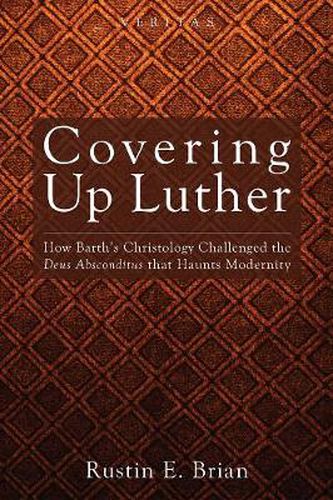Readings Newsletter
Become a Readings Member to make your shopping experience even easier.
Sign in or sign up for free!
You’re not far away from qualifying for FREE standard shipping within Australia
You’ve qualified for FREE standard shipping within Australia
The cart is loading…






This title is printed to order. This book may have been self-published. If so, we cannot guarantee the quality of the content. In the main most books will have gone through the editing process however some may not. We therefore suggest that you be aware of this before ordering this book. If in doubt check either the author or publisher’s details as we are unable to accept any returns unless they are faulty. Please contact us if you have any questions.
Karl Barth’s Christology provides a key to out-narrating the Deus absconditus, which, as Rustin Brian contends, is in fact the god of modernity. Included in this is the rejection of the logical and philosophical systems that allow for the modern understanding of God as the Deus absconditus, namely, dialectics and nominalism. This rejection is illustrated, interestingly enough, in Barth’s decision to literally cover up, with a rug, Martin Luther’s works in his personal library. Surely this was more than a decorative touch. The reading of Barth’s works that results from this starting point challenges much of contemporary Barth scholarship and urges readers to reconsider Barth. Through careful examination of a large body of Barth’s writings, particularly in regard to the issues of the knowledge or knowability of God, as well as Christology, Brian argues that contemporary Barth scholarship should be done in careful conversation with the finest examples of both Protestant and, especially, Roman Catholic theology. Barth’s paradoxical Christology thus becomes the foundation for a dogmatic ecumenicism. Barth’s Christology, then, just might be able to open up possibilities for discussion and even convergence, within a church that is anything but one.
$9.00 standard shipping within Australia
FREE standard shipping within Australia for orders over $100.00
Express & International shipping calculated at checkout
This title is printed to order. This book may have been self-published. If so, we cannot guarantee the quality of the content. In the main most books will have gone through the editing process however some may not. We therefore suggest that you be aware of this before ordering this book. If in doubt check either the author or publisher’s details as we are unable to accept any returns unless they are faulty. Please contact us if you have any questions.
Karl Barth’s Christology provides a key to out-narrating the Deus absconditus, which, as Rustin Brian contends, is in fact the god of modernity. Included in this is the rejection of the logical and philosophical systems that allow for the modern understanding of God as the Deus absconditus, namely, dialectics and nominalism. This rejection is illustrated, interestingly enough, in Barth’s decision to literally cover up, with a rug, Martin Luther’s works in his personal library. Surely this was more than a decorative touch. The reading of Barth’s works that results from this starting point challenges much of contemporary Barth scholarship and urges readers to reconsider Barth. Through careful examination of a large body of Barth’s writings, particularly in regard to the issues of the knowledge or knowability of God, as well as Christology, Brian argues that contemporary Barth scholarship should be done in careful conversation with the finest examples of both Protestant and, especially, Roman Catholic theology. Barth’s paradoxical Christology thus becomes the foundation for a dogmatic ecumenicism. Barth’s Christology, then, just might be able to open up possibilities for discussion and even convergence, within a church that is anything but one.